Resellos on dos caritas - North West Mexico
Southern Baja California was rather a backwater during the revolution. The rebels captured La Paz in March 1914 and as soon as Miguel L. Cornejo was installed as Constitutionalist Jefe Político, Monclova and Ejército Constitucionalista notes began to circulate. But the quantities sent over were not enough, so Carranza authorized Cornejo to issue notes of $5, $10 and $20 and vales of 5c, 10c and 50c.
In October 1914 it was reported that more than $300,000 in Villista paper money had been sent to Baja California. The Chinese shopkeepers in Ensenada were closing their businesses rather than accepting this moneyPrensa, 11 October 1914.
On 9 February 1915 General Félix Ortega, the Jefe Político and Comandante Militar annulled the Cornejo issue. He said that his motive was to avoid the economic isolation of the territory, since the Cornejo notes were not accepted by businesses on the mainland and he was trying to put into circulation a paper currency that was acceptable in Sonora, Sinaloa and Tepic. He told the La Paz town council that holders of Cornejo notes could exchange them over time for money in general circulation (i.e. the first and second issues from Chihuahua (the sábanas and dos caras), and the issues of Pastor Rouaix in Durango, Felipe Riveros in Sinaloa and José Maria Maytorena in Sonora). On 27 May 1915 Ortega decreed (decree núm. 12) that the paper money of those states that submitted to the Convention were of forced circulation until the Convention or Villa himself decreed otherwise.
On [ ] 1915 Urbano Angulo ruled[text needed] that the compulsory issue in the District was that of the Ejército Constitucionalista but because businesses and the general public possessed large quantities of other types of notes, such as the Monclova, dos caras, Brigada de Sinaloa, Estado de Sonora and Cornejo, he had decided to permit their circulation, with the resello of the Jefatura Política or corresponding Presidencia Municipal, with the exception of the Villista notesABCS, Gobernación, vol. 642, exp. 150. He set a punishment of a $500 fine or 60 days’ imprisonment for any storeholder who did not accept notes revalidated by the Jefatura Política ABCS, Gobernación, vol. 640 bis, exp. 63.
La Paz –
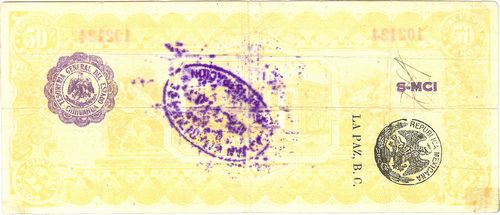
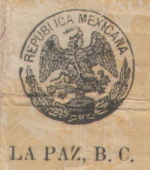 A small round stamp with ‘REPUBLICA MEXICANA’ and eagle with ‘LA PAZ, B.C.’ below.
A small round stamp with ‘REPUBLICA MEXICANA’ and eagle with ‘LA PAZ, B.C.’ below.
La Paz – Comandancia Militar
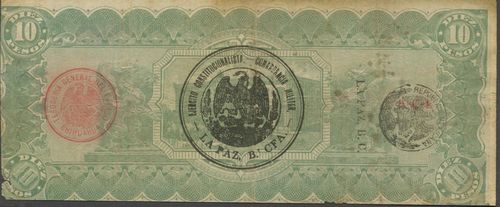
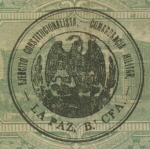 A large black round stamp with ‘EJERCITO CONSTITUCIONALISTA, COMANDANCIA MILITAR, LA PAZ. B. CFA.’
A large black round stamp with ‘EJERCITO CONSTITUCIONALISTA, COMANDANCIA MILITAR, LA PAZ. B. CFA.’
On 10 July 1915 it was decreed that notes revalidated by the Comandancia Militar were of forced circulation in local trading ABCS, Gobernación, vol. 640 bis, exp. 63. However, on 2 August a decree suspended the circulation of notes revalidated by the Comandancia Militar but left in circulation the Ejército Constitucionalista notesABCS,.
Culiacán – Comandancia Militar
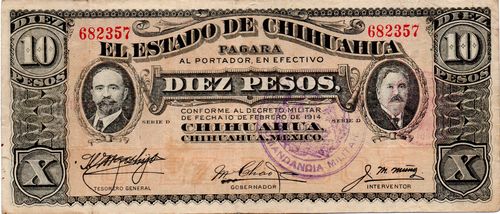
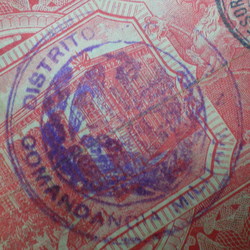 A large (41.5mm) seal withl ‘Distrito de Culiacan - Comandancia Militar’
A large (41.5mm) seal withl ‘Distrito de Culiacan - Comandancia Militar’
San Blas
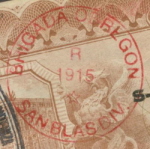 A red round seal with ‘BRIGADA OBREGON, SAN BLAS DIV.’ and R 1915 and a five-pointed star in the centre.
A red round seal with ‘BRIGADA OBREGON, SAN BLAS DIV.’ and R 1915 and a five-pointed star in the centre.
This resello looks and is a later forgery, done to enhance the appearance and value of the host note. It is also found on a 10c Tesorería de la Federación note issued by the Huertista forces in Guaymas, Sonora. As these Tesorería notes were immediately repudiated by the Constitutionalists, they would not have been restamped.
